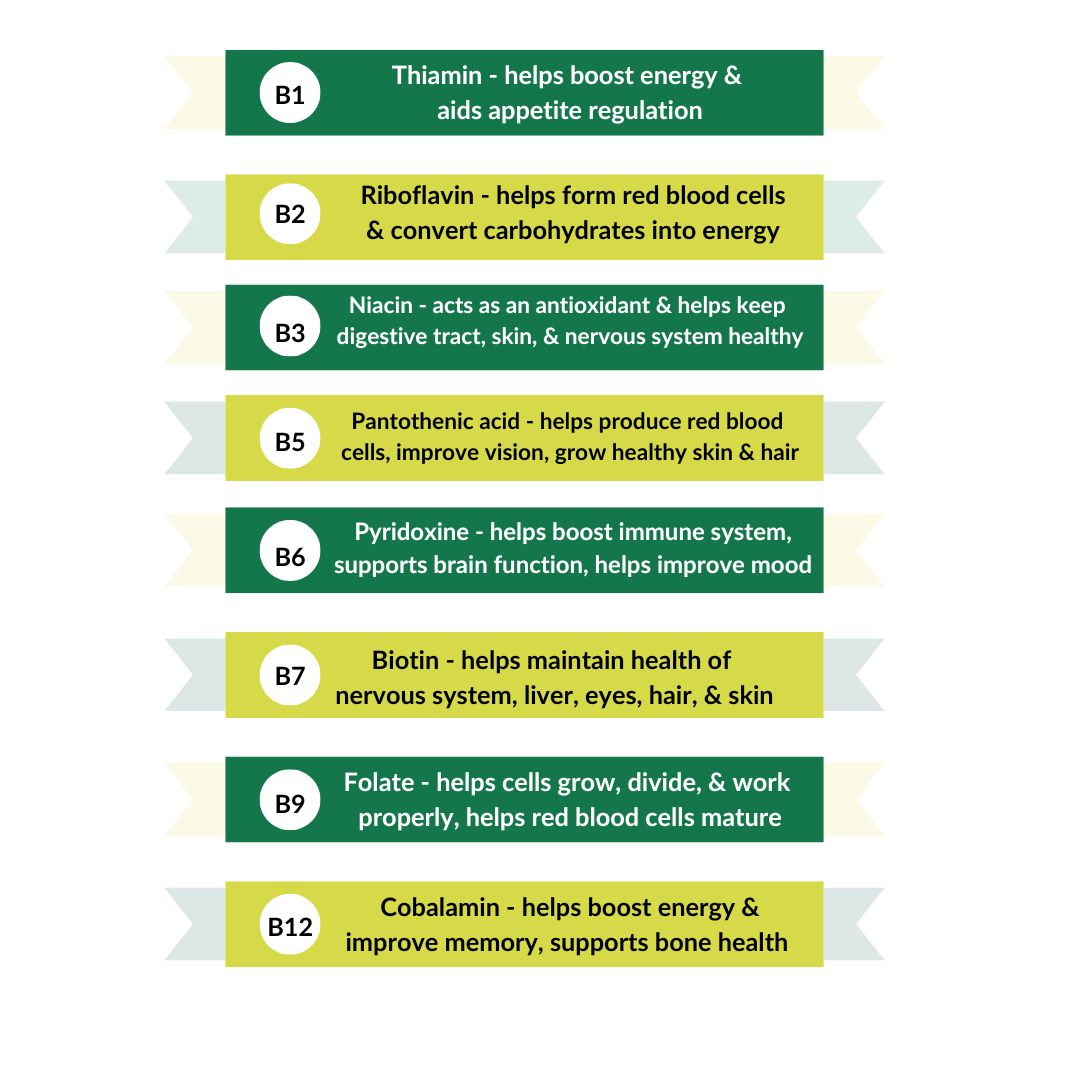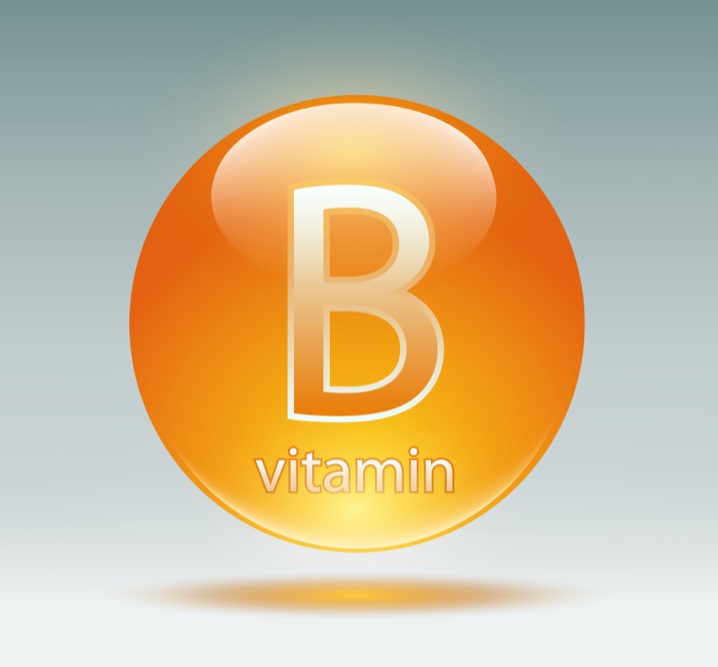
To B or not to B? And, of course our answer is to B….Vitamin B, that is.
 What do you know about Vitamin B? Biotin or Vitamin B7, Folic Acid or Vitamin B9, Vitamin B12 or Cobalamin are members of the B family that we often hear about. Actually, there are 8 vitamins in the B family. They’re all water-soluble vitamins that are a group of eight essential nutrients that play roles in many of our organs and bodily systems. Although they can work together in the body, they also each have their own unique functions.
What do you know about Vitamin B? Biotin or Vitamin B7, Folic Acid or Vitamin B9, Vitamin B12 or Cobalamin are members of the B family that we often hear about. Actually, there are 8 vitamins in the B family. They’re all water-soluble vitamins that are a group of eight essential nutrients that play roles in many of our organs and bodily systems. Although they can work together in the body, they also each have their own unique functions.
B vitamins are important for making sure the body’s cells are functioning properly. They help your body convert food into energy (that's your metabolism at work), create new blood cells, and maintain healthy skin & brain cells, and other body tissues. You may have noticed that these vitamins share similar names (B1, B2, B3, and so on). They do, however they are chemically distinct compounds that often appear together in the same foods.
When you hear about a Vitamin B complex, that lets you know that a dietary supplement contains all eight of the B vitamins. Individual B vitamin supplements are referred to by the specific number or name of each vitamin, such as B1 for thiamine, B2 for riboflavin, and B3 for niacin.
You may know some of the B vitamins by their names rather than by their numbers. Those include for pantothenic acid (B5), biotin (B7), and folate (B9). Vitamin B6 is also known as pyridoxine, and cobalamin is B12.

Why are there gaps in the B Vitamin numbers?
That's a good question. In the past, certain substances were referred to as vitamins as they were once believed to be vitamins. They are no longer considered to be, so the numbers that were assigned to them now form the "gaps" in grouping of the 8 essential nutrients that make up the B-complex vitamins. There's no B4 in the B-complex but it is a favorite in a Bingo game!
What does water-soluble mean?
Water soluble refers to the ability of a substance to dissolve in water. This term is most often used in chemistry, and it is used to describe how easily a substance can be dissolved in water.
All vitamins are categorized as either water-soluble or fat-soluble. The water-soluble vitamins are vitamin C and all the B vitamins. (The fat-soluble vitamins are A, D, E, and K.) Vitamins perform many functions in our bodies; just a few of those include making red blood cells, synthesizing bone tissue, and supporting normal vision, nervous system function, and immune system function.
Essential Nutrients
 We mentioned above that the B Vitamins are a group of eight essential nutrients. So, what’s an essential nutrient?
We mentioned above that the B Vitamins are a group of eight essential nutrients. So, what’s an essential nutrient?A nutrient is used by an organism to survive, grow, and reproduce. An essential nutrient is a nutrient required for normal physiological function that can't be synthesized in the body – either at all or in sufficient quantities . That means we have to acquire it from a dietary source. We all know we need water; that keeps us going.
Dietary Sources for Vitamin B include:
• Thiamin (B1)
Whole grains and fortified bread, cereal, pasta, and rice
Meat (especially pork) and fish
Legumes (such as black beans and soybeans), seeds, and nuts
• Riboflavin (B2)
Eggs, organ meats (such as kidneys and liver), lean meats, and low-fat milk
Some vegetables (such as mushrooms and spinach)
Fortified cereals, bread, and grain products
• Niacin (B3)
Poultry, beef, pork, and fish
Some types of nuts, legumes, and grains
Enriched and fortified foods, such as many breads and cereals
• Pantothenic acid (B5) is naturally present in almost all foods.
Beef, poultry, seafood, and organ meats
Eggs and milk
Vegetables such as mushrooms (especially shiitakes), avocados, potatoes, and broccoli
Whole grains, such as whole wheat, brown rice, and oats
Peanuts, sunflower seeds, and chickpeas
• Vitamin B6
Poultry, fish, and organ meats
Potatoes and other starchy vegetables
Fruit (other than citrus)
• Biotin (B7)
Meat, fish, eggs, and organ meats
Seeds and nuts
Certain vegetables (such as sweet potatoes, spinach, and broccoli)
• Folate (B9)
Beef liver
Vegetables (especially asparagus, brussels sprouts, and dark green leafy veggies like spinach & mustard greens
Fruits and fruit juices (especially oranges and orange juice)
Nuts, beans, and peas (such as peanuts, black-eyed peas, and kidney beans)
• Vitamin B12
Fish, meat, poultry, eggs, milk, and other dairy products
Clams and beef liver
Some breakfast cereals, nutritional yeasts, and other food products are fortified with vitamin B12

What are some of the signs of Vitamin B deficiencies?
Vitamin B deficiencies may show up in various ways. Signs of thiamin deficiency include shortness of breath, low blood pressure, irregular heart rhythm, fatigue, nerve damage, anxiety, muscle cramps, and chest pain. People with a riboflavin deficiency may feel depressed; have oily, dry, scaly skin; and exhibit sensitivity to light.
Pantothenic acid deficiencies may include nausea, numbness of the extremities, muscle cramps, and stomach pain. Signs of folic acid deficiency may include impaired cell division, anemia, headache, loss of appetite, diarrhea, fatigue, paleness, or insomnia. Vitamin B12 deficiency causes anemia, which may be caused by inadequate consumption of B12 or an inability to absorb it properly. Other indicators may include memory loss, abnormal gait, nerve damage, decreased reflexes, eye problems, and digestive disorders.
Supplementing with Vitamin B
 B vitamins are essential for energy generation, healthy digestion, nervous system functions, and a healthy appetite. Vitamin B, as we noted, can be found in many foods and drinks we enjoy every day. However, you may want or need to add a Vitamin B supplement to your daily routine. Perhaps you’re feeling that you might need more energy, enhance your gastrointestinal tract so it works more efficiently, or want to support your eyes, hair, and skin.
B vitamins are essential for energy generation, healthy digestion, nervous system functions, and a healthy appetite. Vitamin B, as we noted, can be found in many foods and drinks we enjoy every day. However, you may want or need to add a Vitamin B supplement to your daily routine. Perhaps you’re feeling that you might need more energy, enhance your gastrointestinal tract so it works more efficiently, or want to support your eyes, hair, and skin.
If you'd like to add some professional grade, scientifically formulated nutritional supplements to your goal of wellness and wellbeing, we've got some options for you.
How to choose a B Vitamin supplement or homeopathic
 You may have heard us say this once or twice....or even more than that. Not all supplements are created equal. These 2 tips actually apply to all vitamins, minerals, dietary supplements, and homeopathic formulations.
You may have heard us say this once or twice....or even more than that. Not all supplements are created equal. These 2 tips actually apply to all vitamins, minerals, dietary supplements, and homeopathic formulations.
• Look for products that are made by a trusted manufacturer
• Have been tested by an independent third-party
When purchasing supplements, buy quality science-based, professional-grade nutritional and herbal supplements, vitamins, minerals, and homeopathics. These products are manufactured to meet or exceed GMP certification, FDA monitored, and are independently tested several times throughout the manufacturing process for purity and efficacy. Just like the ones you get here at Naturally Botanicals.
Vitamin B options available right here....with free shipping every day
Take a look at these products by NuMedica, Dynamic Nutritional Associates (DNA Labs), and Professional Botanicals. Three brands you can buy with confidence, knowing you are buying the very best. Quality you can trust.
- Methyl B-12 HP by NuMedica - a great tasting lozenge providing 5 mg (5,000 mcg) of Vitamin B12 in the active, methylcobalamin form
- Vitamin B Complex by Professional Botanicals - doctor formulated to support the body with a complete, complex source of B Vitamins
- B-6/250 by Dynamic Nutritional Associates (DNA Labs) - may help provide nutritional support for indications including fatigue, numbness and tingling, and low mood
- B-12 by Dynamic Nutritional Associates (DNA Labs) - This high-potency B-12 liquid may be used to support indications of fatigue or lethargy, numbness and tingling, trouble sleeping, restless legs, and susceptibility to infections
- B-12 Folic Acid by Dynamic Nutritional Associates (DNA Labs) - B-12 Folic Acid liquid is designed to support energy levels, support healthy nerves, and support a healthy immune system
- Find more products with Vitamin B here
Feel better the natural way...with Naturally Botanicals.

_______________________________________________________________________________________________
Note: The content of this article, and additional content on this website, are for informational purposes only and are not intended to be a substitute for professional medical advice, diagnosis, or treatment. Always seek the advice of a physician or other qualified health provider with any questions you may have regarding a medical condition. Never disregard professional medical advice or delay in seeking help because of something you read here on this website.



